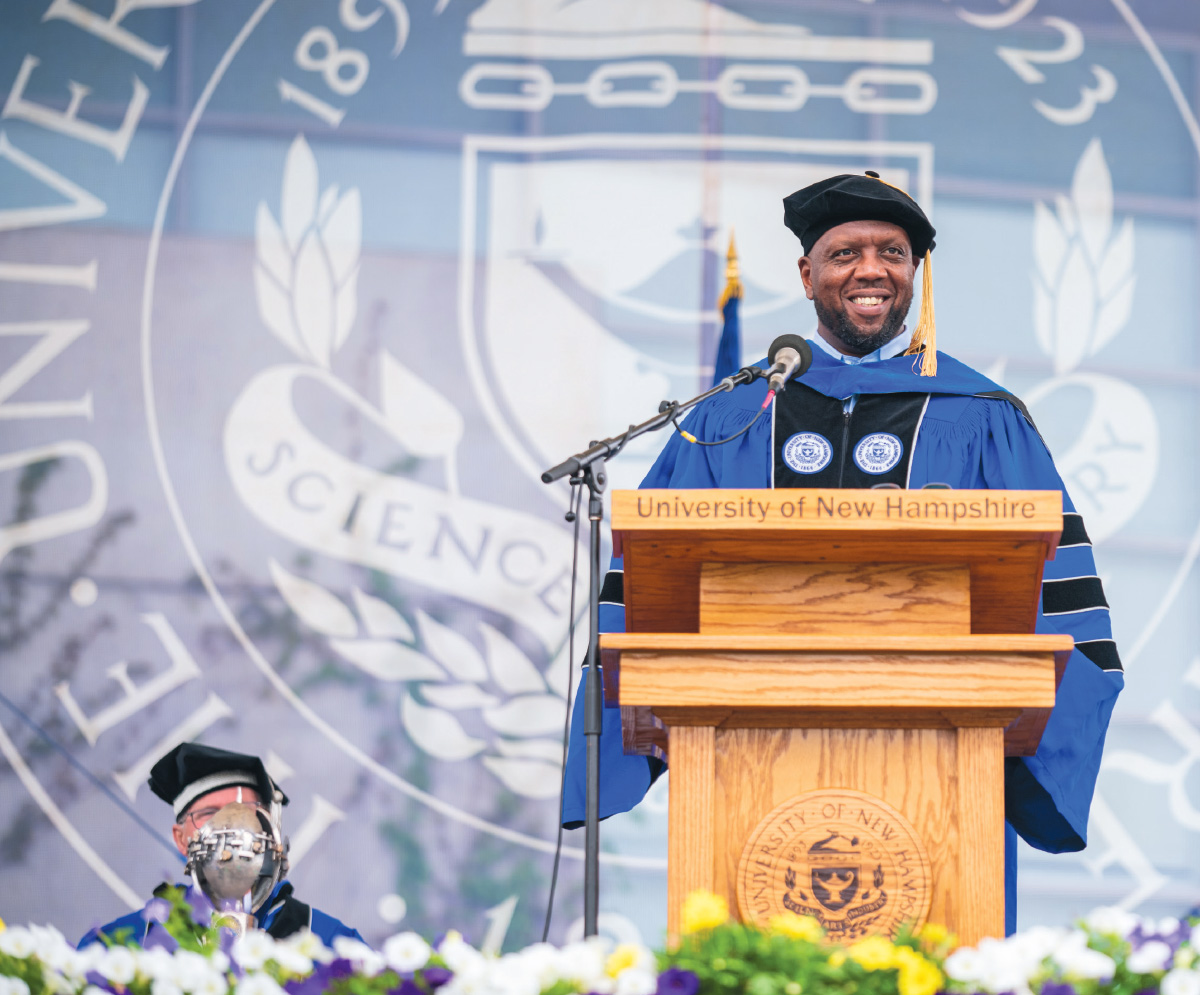MARTIN KIMANI

You can watch his full speech here : bit.ly/3NxLwnb
How did he find UNH: He and a friend used Barron’s Book of Colleges, that giant 700-page tome that served as the popular go-to resource for comparing and choosing colleges before the age of websites and emails.
Family man: He and his wife, June, have two children (a son, 9, and a daughter, 10). “Fatherhood is a great joy of my life, nothing comes close to it,” he says. “It’s cliché but it’s the most important job to produce happy, stable children. And it’s harder than I thought!”
He was watching CNN coverage of the 1994 Rwandan genocide, a 100-day conflict in which roughly 800,000 Rwandans were killed. The conflict garnered international attention for its brutality against civilians, mostly the minority Tutsi people.
Because Rwanda is close to Kenya, dormmates were asking Kimani for his thoughts.
“I couldn’t, for the life of me, explain it,” Kimani recalls. The moment stuck with him, almost an embarrassment that he wasn’t more knowledgeable of the conflict, and that he couldn’t provide his peers with some insight on it.
Juxtaposing that tragedy was the May 1994 election of Nelson Mandela, anti-apartheid activist, to the presidency of South Africa — the first non-white person to hold the position.
Kimani felt a call to action.
“I read everything I could about the genocide, I saw the pictures of the bodies in rivers, it was very brutal, and at the same time you have this amazing election in South Africa that brings Mandela to power. These were two very pivotal events for me, and I experienced them at UNH,” he says. “When I left UNH I tried to be a Wall Street guy, but already in my mind I was meant to be something different. Those experiences really stuck with me and made me feel I needed to know more, needed to somehow be involved … to stop those kinds of issues, to understand them.”
At commencement ceremonies in May, he told graduating students how his experiences at UNH shaped his career.
The Road to UNH
But Kimani was a little older than the average freshman — he was already 21 when he enrolled. That, combined with the lack of diversity in Durham, meant he was still trying to find where he belonged among a sea of undergrads.
“UNH was for me both a shock and a revelation,” recalls Kimani. “It was a large university, where I had a lot of freedom to explore, but it was very far from home, so I was also adjusting to a new culture, a new way of being.”
It wasn’t long before Kimani found his way — and his community, among fellow students and caring faculty.
“I become friends with really strange people — strange in the sense that they were out of the mainstream in their thinking. They were politically active, or people who liked odd genres of music, really interesting people,” he recalls. Among his faculty connections was Professor Andrew Christie Jr., of the philosophy department. “He introduced me to his family; he seemed to understand I was having a unique experience being so far from home and was so kind to me.”
As an undergrad, he was also involved with the Black Student Union and politics, was a student tutor, and was very active in intramural sports, especially soccer, competing with other halls.
He started as a business student but was academically swayed once he took a general education course called Intro to Philosophy with Professor Duane Whittier.
“It just blew my mind. The deep inquiry and intellectual rigor were demanding, I hadn’t encountered that before. He was one of my favorite teachers throughout my life. The class grabbed my imagination, and I thought I might go on to graduate school to become a philosophy teacher, I was so inspired.”
Diplomacy Work
“Diplomacy is 90% a grind, and then it’s small incremental attempts to improve a situation that offers you, every once in a while, the potential for great change,” says Kimani. “Those are the rewards, when you can make a difference in the fate of your country, or in the fate of your country’s relationship with other countries.”
Kimani garnered much publicity earlier this year when he spoke on the conflict in Ukraine through the lens of colonialism in Africa.
“I had no thought it was going to go viral,” he said. “I really needed to express what we think of the matter as Kenyans and do so in a way that offers something impactful.”
Kimani has vast experience with Africa’s struggles and the idea of hostile invasions. He previously served as director of Kenya’s National Counter Terrorism Centre and earned a master’s degree and a Ph.D. in war studies at King’s College, University of London, in 2003 and 2010, respectively.
He feels some of the speech’s context or meaning has been weaponized, especially amid the information war going on inside Ukraine and Russia. Whatever the interpretation, Kimani stresses the key point in his message: “Africa has a story that is of benefit to the world. People may see us as poor and conflict-ridden, but at the core of our political arrangement is a profoundly moral choice.
“This was a moment for us to say to the world you can learn from Africa and how we have chosen to approach our past and our future, and why we are seeking to build a future in a more peaceful way.”